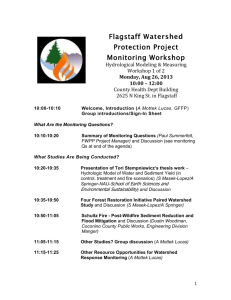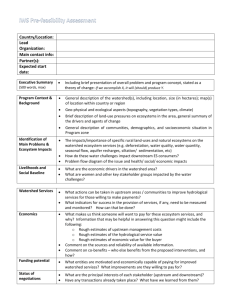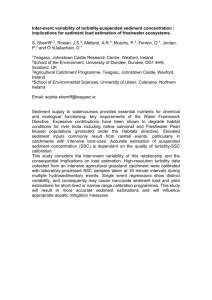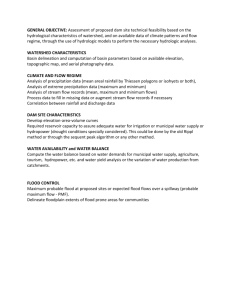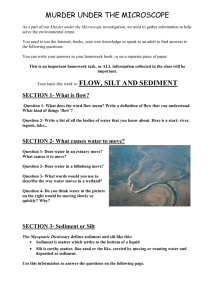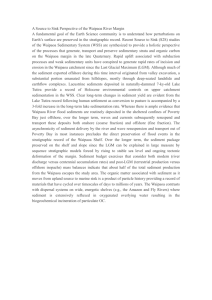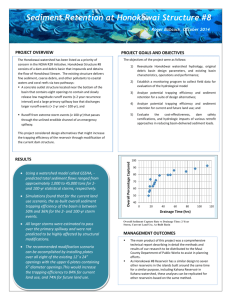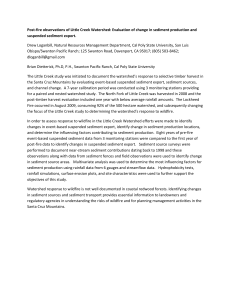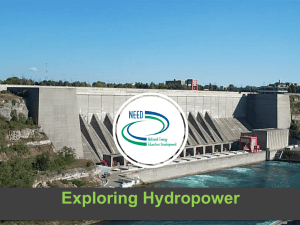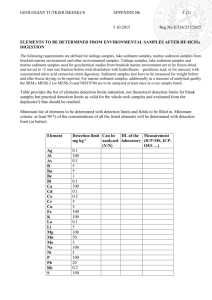1200256 Investment Prioritization for Watershed
advertisement
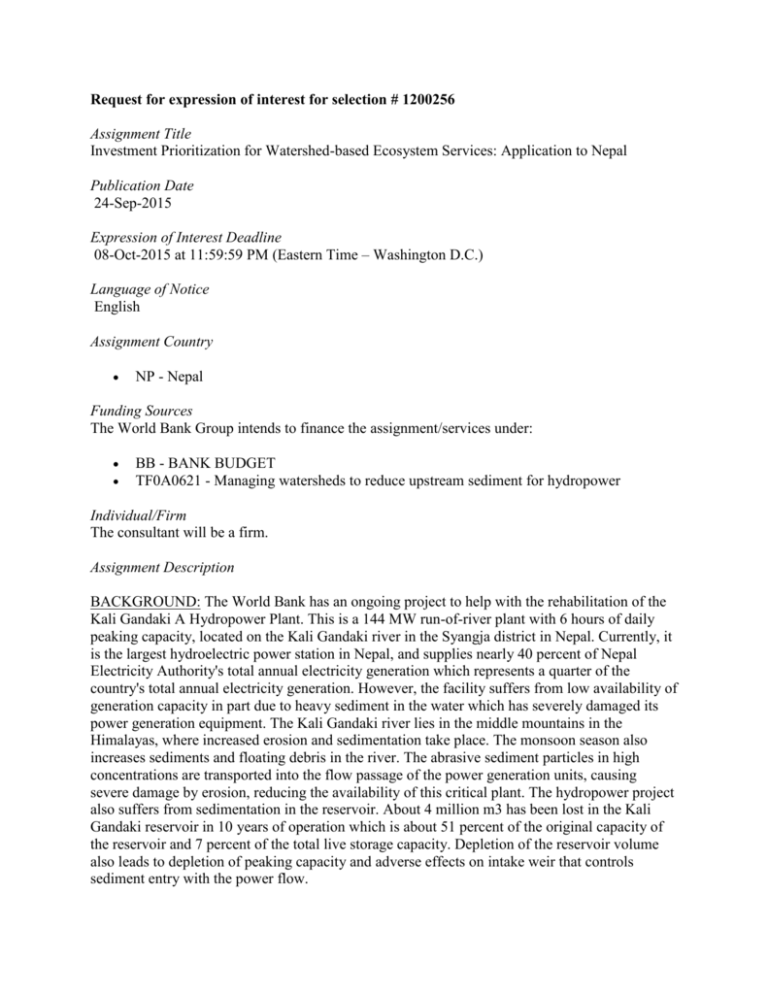
Request for expression of interest for selection # 1200256 Assignment Title Investment Prioritization for Watershed-based Ecosystem Services: Application to Nepal Publication Date 24-Sep-2015 Expression of Interest Deadline 08-Oct-2015 at 11:59:59 PM (Eastern Time – Washington D.C.) Language of Notice English Assignment Country NP - Nepal Funding Sources The World Bank Group intends to finance the assignment/services under: BB - BANK BUDGET TF0A0621 - Managing watersheds to reduce upstream sediment for hydropower Individual/Firm The consultant will be a firm. Assignment Description BACKGROUND: The World Bank has an ongoing project to help with the rehabilitation of the Kali Gandaki A Hydropower Plant. This is a 144 MW run-of-river plant with 6 hours of daily peaking capacity, located on the Kali Gandaki river in the Syangja district in Nepal. Currently, it is the largest hydroelectric power station in Nepal, and supplies nearly 40 percent of Nepal Electricity Authority's total annual electricity generation which represents a quarter of the country's total annual electricity generation. However, the facility suffers from low availability of generation capacity in part due to heavy sediment in the water which has severely damaged its power generation equipment. The Kali Gandaki river lies in the middle mountains in the Himalayas, where increased erosion and sedimentation take place. The monsoon season also increases sediments and floating debris in the river. The abrasive sediment particles in high concentrations are transported into the flow passage of the power generation units, causing severe damage by erosion, reducing the availability of this critical plant. The hydropower project also suffers from sedimentation in the reservoir. About 4 million m3 has been lost in the Kali Gandaki reservoir in 10 years of operation which is about 51 percent of the original capacity of the reservoir and 7 percent of the total live storage capacity. Depletion of the reservoir volume also leads to depletion of peaking capacity and adverse effects on intake weir that controls sediment entry with the power flow. Sediment management is needed to improve the efficiency of the hydropower project. A number of sediment management practices have been used in various hydropower projects to handle sediment inflow to the facility, including techniques to route inflow sediments beyond the storage pool to minimize deposition and dredging and excavation to increase or recover reservoir volume. It is however also important to manage sediment upstream to reduce sediment inflow into the hydropower facility. Upstream erosion control and sediment trapping techniques usually include watershed management and protection measures, control of construction sediments, terracing, reforestation, check dams, etc. Forests in the catchment of hydropower facilities, for example, provide soil retention services that can, in turn, help to reduce sediment inflow. Investments in the forested catchment of the watershed need to be prioritized to maximize soil retention services, however. Recognizing the need for upstream sediment management, the Kali Gandaki project includes a sub-component -- Catchment Area Treatment (CAT) Plan -- to manage sediment through investments in the upper catchment which covers an area of 7,618 square kilometers. A study has been initiated to support the project component on CAT planning through identification and prioritization of a portfolio of investments that can help control erosion in the catchment. The objectives of this study are (i) identify and prioritize investments in the upstream catchments to reduce sediment inflow to the Kali Gandaki A Hydropower Plant; (ii) build capacity within Nepal Electricity Authority (NEA) and other relevant departments to apply tools and processes for improved watershed management; (iii) facilitating knowledge exchange and dissemination of upstream sediment management approaches with other countries. To support these objectives, the World Bank is looking for technical assistance in watershed management investment prioritization aimed at reducing sediments flow into the hydropower project. We would like to request expression of interest for the provision of such technical assistance. ASSIGNMENT DESCRIPTION: The specific tasks required are as follows: Task 1: Technical assistance in watershed management investment prioritization. Provide technical support to identify best locations and activities to maximize soil retention services in catchments to reduce sediment flow into hydropower projects. The World Bank will also separately contract a hydrology modeler to estimatequantity of sediment reduction based on suggested investments. Interface with hydrology modeler is required to integrate investment prioritization with hydrology model. Task 2: Technical assistance in engaging stakeholder to inform watershed management investment prioritization. Provide technical assistance during stakeholder consultation to ensure that watershed management investment prioritization is based on best available data and parameters, and best represents local contexts, including reflection of stakeholder objective, considering local watershed management practices, etc. Task 3: Provide training in watershed management tools and practices. Task 3.1 Provide training to NEA and relevant departments in Nepal, presenting approach and process in watershed management investment prioritization tools, facilitate understanding of its contribution to hydropower projects. Task 3.2 Attend a workshop in Bhutan to introduce watershed management investment prioritization tools and its contribution to reduce sediment into hydropower projects. Task 4: Prepare reports. Task 4.1: Prepare report on watershed management investment prioritization results for Kali Gandaki. Task 4.2: Prepare general guidance note on watershed management investment prioritization tools. SUBMISSION REQUIREMENTS: The World Bank now invites eligible firms to indicate their interest in providing the services by submitting an Expression of Interest. Interested firms must provide information indicating that they are qualified to perform the services (experience in similar conditions, availability of appropriate skills, description of similar assignments, etc.). Please note that the total size of all attachments should be less than 5 MB. Expressions of interest should be submitted in English through World Bank Group eConsultant2 NOTES: Following this invitation for Expression of Interest, a shortlist of qualified firms will be formally invited to submit proposals. Qualification Criteria 1. Provide information showing that they are qualified in the field of the assignment, with demonstrated professional experience and technical expertise in watershed management investment prioritization. * 2. Provide information on prior experience in watershed management investment prioritization for hydropower projects targeting soil retention in Nepal/South Asia. * 3. Provide information on their core business and years in business. * 4. Provide information on the qualifications of key staff. * * - Mandatory Selection and contracting will normally be made from responses to this request for expression of interest. The consultant will be selected from a shortlist, subject to availability of funding.
